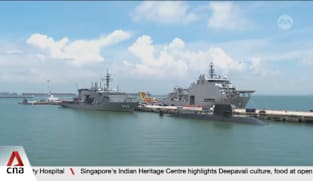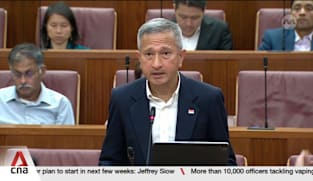Debate on President’s Address: Gerald Giam on education as ‘launchpad’ for students and strengthening financial literacy of Singaporeans
A linchpin of Singapore’s system of meritocracy is its education system, said MP Gerald Giam. Speaking in Parliament on Monday (Apr 17), he pointed out that the education system has gone through several changes over the years, from streaming to Full Subject-Based Banding. Yet even with these changes, examinations and the approach to “sort” students for subject combinations remain central, he said. He stressed the need to make the education system less of a “sorting mechanism” for identifying students' abilities, and more of a launchpad for students to discover their strengths and interests, as well as develop deep skills in their areas of interest. He added that the education system should provide more opportunities for students to pursue their interests, as long as they have demonstrated their commitment and ability to complete the whole course of study. It also has to move away from the over-emphasis on preparing for high-stakes examinations and place greater focus on enjoying learning and achieving subject and skills mastery. Mr Giam highlighted another area that the Government should focus on - helping its people gain financial know-how and confidence to manage their own personal finances. He said there is a need to plug the current financial literacy gap and empower Singaporeans with the knowledge and confidence to take greater ownership of their financial well-being. He suggested three ways of doing this. Firstly, the Government should develop a national financial literacy framework to provide a systematic basis for benchmarking improvements in financial literacy levels over time. Secondly, the Government should set up a national financial education programme under the Ministry of Education to provide proactive and comprehensive financial education for Singaporeans across all ages. Thirdly, the Government should explore other asset classes for retirement planning in order to achieve better diversification and improve returns on their assets. Mr Giam said equipping Singaporeans with greater financial knowledge and confidence will enable them to take charge of their financial well-being and make better-informed decisions on their personal finances. Strengthening Singaporeans’ financial literacy resilience will also enhance the country’s resilience, he said.
A linchpin of Singapore’s system of meritocracy is its education system, said MP Gerald Giam. Speaking in Parliament on Monday (Apr 17), he pointed out that the education system has gone through several changes over the years, from streaming to Full Subject-Based Banding. Yet even with these changes, examinations and the approach to “sort” students for subject combinations remain central, he said. He stressed the need to make the education system less of a “sorting mechanism” for identifying students' abilities, and more of a launchpad for students to discover their strengths and interests, as well as develop deep skills in their areas of interest. He added that the education system should provide more opportunities for students to pursue their interests, as long as they have demonstrated their commitment and ability to complete the whole course of study. It also has to move away from the over-emphasis on preparing for high-stakes examinations and place greater focus on enjoying learning and achieving subject and skills mastery. Mr Giam highlighted another area that the Government should focus on - helping its people gain financial know-how and confidence to manage their own personal finances. He said there is a need to plug the current financial literacy gap and empower Singaporeans with the knowledge and confidence to take greater ownership of their financial well-being. He suggested three ways of doing this. Firstly, the Government should develop a national financial literacy framework to provide a systematic basis for benchmarking improvements in financial literacy levels over time. Secondly, the Government should set up a national financial education programme under the Ministry of Education to provide proactive and comprehensive financial education for Singaporeans across all ages. Thirdly, the Government should explore other asset classes for retirement planning in order to achieve better diversification and improve returns on their assets. Mr Giam said equipping Singaporeans with greater financial knowledge and confidence will enable them to take charge of their financial well-being and make better-informed decisions on their personal finances. Strengthening Singaporeans’ financial literacy resilience will also enhance the country’s resilience, he said.



















